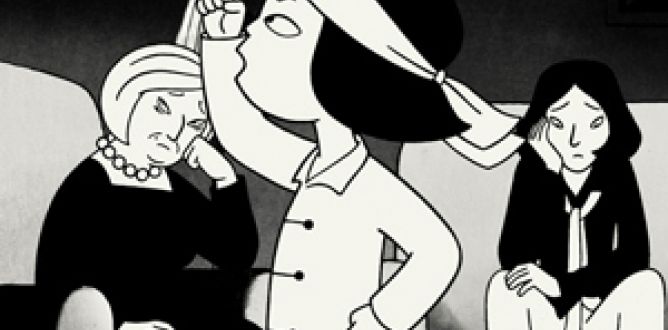Persepolis Parent Guide
Parent Movie Review
It’s often been said that comedy comes from tragedy. That might explain the moments of biting humor found in the Oscar-nominated movie Persepolis.
Animated almost exclusively in black and white, this graphic novel brought to film is the autobiographical story of Marjane Satrapi, a comic artist, writer, illustrator and author of children’s books. In it, she tells of her life as a young Iranian girl (voiced at different ages by Gabrielle Lopes Benites, Gabrielle Lopes and Chiara Mastroianni) born in a politically minded family shortly before the fall of the Shah. As a child, she imagines becoming a prophet. But in the meantime her outspoken, puckish nature leads to less saintly activities like threatening to rake other children with a fistful of nails.
While her interactions seem anything but playful, they are easier to understand considering the oppressive, war torn state in which she lives. However when the Shah is ousted, political unrest escalates. Arrests, executions and bombings become commonplace. Street riots turn bloody. Worried for her safety, Marjane’s parents (voiced by Catherine Deneuve and Simon Abkarian) send her to school in Vienna. But there, the young teen is shuffled from house to house until she finally ends up on the streets. Exposed to the drug culture and underground society, she loses her virginity and is ultimately reduced to eating garbage. Finally, buffeted and beaten by life in Europe, she returns to Iran to find a country more repressed than ever.
At times, the high contrast animation style only emphasizes the harshness of Marjane’s life as favorite relatives are murdered for opposing political views and her mother is attacked and publicly humiliated by a zealot of the reigning regime. Still, despite their severe surroundings, the family maintains their personal integrity thanks in part to the wise influence of Marjane’s grandmother (voiced by Danielle Darrieux).
Because of frequent profanities, abundant amounts of sexual and anatomical discussions, illegal drug use and the detailed portrayal of war violence, Persepolis is a film parents will want to consider carefully before showing to their older teens. Yet Marjane, who co-directed and co-wrote the screenplay, tells her story with insight and comic candor. Although not suitable for all audiences, Persepolis brings a plainspoken personal perspective to the upheaval rocking the Middle East that will likely spark plenty of political discussion.
Starring Marjane Satrapi. Theatrical release January 31, 2008. Updated March 31, 2009
Persepolis
Rating & Content Info
Why is Persepolis rated PG-13? Persepolis is rated PG-13 by the MPAA for mature thematic material including violent images, sexual references, language and brief drug content.
Political unrest and war are the backdrops for this animated film that includes repeated portrayals of shootings, bombings, executions, torture and oppression. Using cutting humor to deal with her circumstances, Marjane occasionally finds herself in trouble after accusing nuns of prostitution, defying political conventions by purchasing Western items on the black market and speaking out in school. Becoming sexually active as a teen, Marjane also faces rejection after one boyfriend declares he is now a confirmed homosexual and another is discovered in bed with a new woman. Illegal drug use by teens, smoking and drinking are shown. Frequent profanities (including a strong sexual expletive and hand gesture) and a number of sexual discussions concerning male anatomy are also in the script, along with some irreverent references to Deity. As well, a character deals with depression, prescription drug use and an attempted suicide.
Page last updated March 31, 2009
Persepolis Parents' Guide
What does Marjane’s grandmother mean when she says “fear lulls our minds to sleep”? What impact does this older relative have on her granddaughter? How is she a voice of reason in the family?
Freedom and justice are words often bantered around in society. What meaning would these terms have in a more oppressive culture? Can a person be free while living in repressive conditions?
How does Marjane’s childhood differ from others in her country? What impact do the circumstances have on her as a child? What does she learn about herself and her country when she moves to Vienna? Why is she drawn back to her homeland?
Check out this website to learn more about Marjane Satrapi and her graphic novel Persepolis: http://en.wikipedia.org/wiki/Marjane_Satrapi
Home Video
The most recent home video release of Persepolis movie is June 23, 2008. Here are some details…
DVD Release Date: 24 June 2008
Persepolis, Marjane Satrapi’s graphic novel turned animation, releases to DVD and Blu-ray Disc. The latter format also includes the following bonus materials: an English language version of the film featuring the voices of Chiara Mastroianni, Sean Penn, Catherine Deneuve, Gena Rowlands and Iggy Pop, audio commentary of selected scenes by Marjane Satrapi, Vincent Paronnaud, Chiara Mastoianni, animated scene comparisons with commentary by Marjane Satrapi, and questions and answers with the cast and crew recorded at the 2007 Cannes Film Festival Press Conference. As well, there are two featurettes: The Hidden Side of Persepolis (the making of the French version) and Behind the Scenes of Persepolis (the recording of the English version).
Related home video titles:
Unrest in the Middle East has become the subject of several movies in recent years. In A Mighty Heart, the wife of a political journalist faces uncertainty and fear when Islamic extremist in Pakistan capture her husband. Paradise Now tells the story of two suicide bombers chosen to carry out a mission in Tel Aviv. Both films deal with difficult subject matter and contain content concerns that may not be suitable for all audiences.
The movie Children of Heaven depicts a different view of the life and challenges faced by a youngsters growing up in Iran.

